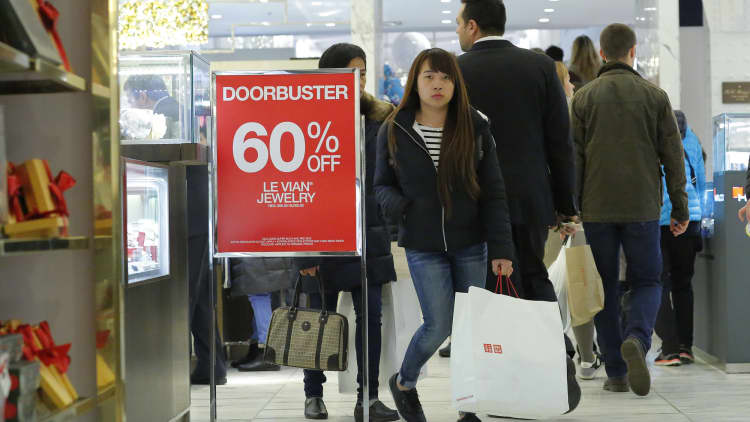
Your local Macy's store may soon look a lot different.
Roughly one week before President Jeff Gennette takes the reins from longtime CEO Terry Lundgren, the incoming chief executive gave Wall Street a taste of what the company's future might look like.
Speaking at the Bank of America Merrill Lynch Consumer & Retail Technology Conference in New York City Tuesday, Gennette walked investors through five tests Macy's is conducting that could eventually be rolled out across its fleet.
Dedicated clearance racks
To preserve margins on dated merchandise, Macy's is rolling out a specific section in its stores meant for marked down goods. Called Last Act, these areas make deals simple to understand by using a clearly marked price tag and prohibiting the use of coupons.
The sections also benefit Macy's profits. First, by removing old merchandise from its full-price racks, the company can sell more of its in-season goods without a discount. The clearance spaces have also helped the chain charge more on older merchandise.
Macy's tested these areas in 10 of its stores last year and plans to roll them out to another 30 locations in 2017, Gennette said.
Fewer coupons
Macy's will always be a promotional department store — but it can get more creative about how it delivers value to customers, Gennette said.
Take, for instance, its coupons. Though shoppers love the discounts coupons provide, they hate the exclusions required by certain vendors. By shifting its strategy to offer $10 off of $50 and similar offers, the chain can provide bargains without discounting specific brands.
Exploration of this new tactic comes as vendors like Michael Kors and Coach are dialing back the volume of handbags they ship to department stores, which were perpetually discounting their products.
Less reliance on sales associates
Waiting for an employee to grab a pair of black pumps in size 7 can be trying for time-crunched shoppers. So Macy's is piloting a model through which customers serve themselves in the shoe department, grabbing pairs from a selection of boxes on the sales floor.
The company started the experiment in small stores about a year ago and will expand the test to some of its larger locations this year. Meanwhile, Macy's is experimenting with self-service in its beauty departments.
A bigger beauty focus
In addition to letting customers do more hands-on testing in its beauty department, Macy's will roll out dedicated sections for its private label Impulse in additional stores.
It will also expand the footprint of its higher-end Bluemercury brand to drive traffic among millennial shoppers. These young customers are fueling big growth in the beauty category, particularly as it relates to cosmetics.
Macy's isn't alone in targeting the beauty industry for growth. J.C. Penney is opening Sephora shops in more of its stores, as specialty retailers like Ulta growth their square footage.
More branded shop-in-shops
Macy's is rolling out branded LensCrafters shops to more of its stores this year, following up existing partnerships with the likes of Sunglass Hut and Finish Line.
Over time, Gennette says licensed departments could become a bigger part of Macy's businesses, with an emphasis on partners who provide both goods and services.
These types of partnerships have been hit or miss for Macy's. While Gennette said the LensCrafters partnership has helped drive traffic to Macy's stores, the CEO of Tailored Brands recently called its Men's Wearhouse's tuxedo shops in Macy's "disappointing."


